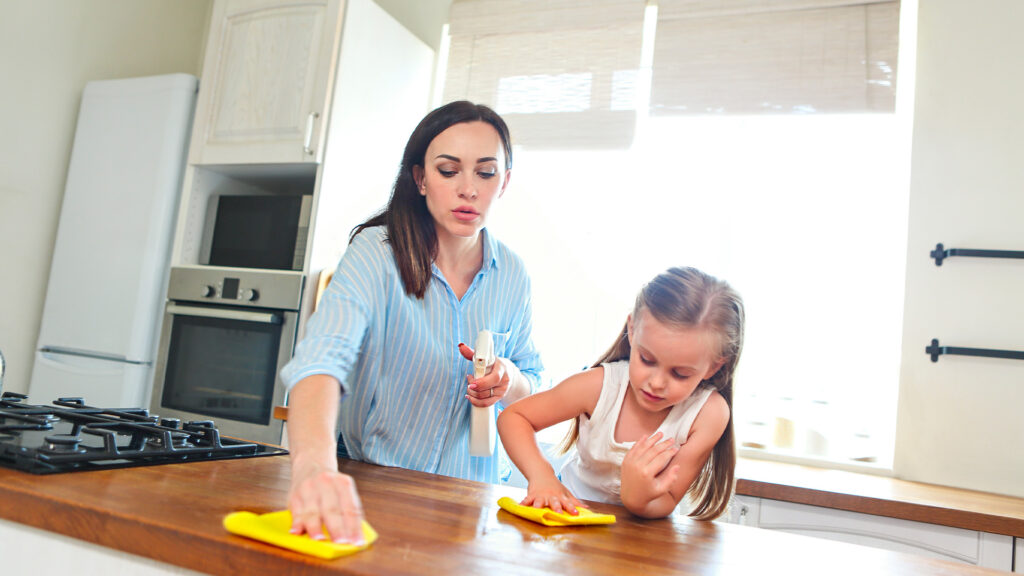Raising tidy kids is a challenging yet rewarding task for parents. It’s not only about instructing them to put away their things, but also cultivating in them a sense of accountability and admiration for their environment.
This blog post will provide you with five effective strategies to help your young children learn the importance of cleaning up after themselves, and learn through doing their chores, at an early age.
First, we’ll delve into the magic of “When-Then” statements, a simple yet powerful tool that can make tidying tasks more appealing to kids. Next, we will discuss how an appreciation of shared responsibility helps kids learn the importance of cleanliness.
We’ll then explore ways to engage children in decision-making processes related to cleanliness. This active participation can significantly increase their willingness to keep things neat and tidy. Finally, as our children grow older and seek more independence, it’s crucial that we adapt our approach towards encouraging tidiness without stifling their autonomy.
In essence, raising tidy kids is about much more than just having a spotless home – it’s about nurturing responsible individuals who understand the value of taking care of their environment.

The Magic of When-Then Statements
One crucial strategy in raising tidy kids is the effective use of “When-Then” statements. This method can be particularly useful during times of transition, guiding children towards tidying up without it feeling like a chore or punishment. Let’s investigate the utilization of this strategy and its advantages.
Understanding When-Then Statements
“When-Then” statements work wonders with kids. You state when a task will be done, then follow it up with something they enjoy. For example, “When you’ve put your toys away, then we can start our movie night.”
This approach works because it provides clear expectations and incentives for completing tasks. Positive Parenting Solutions offers more insights into why these instructions tend to work better than traditional commands.
Applying When-Then Statements For Tidying Tasks
To apply this strategy effectively for tidiness-related tasks:
- Determine the task: Identify what needs completion – picking up toys or putting dirty clothes in the laundry basket.
- Create an incentive: Think about what your child enjoys doing after chores – playing video games, or going out for ice cream?
- Craft your statement: Combine these elements into a concise statement like “When all your Lego pieces are back in their box, then we’ll head out for some delicious ice cream.”
Note that consistency is key; stick by your words to avoid confusing them about consequences and rewards.

Empowering Kids Through Shared Responsibility
The responsibility of maintaining a clean and tidy home shouldn’t just be on parents. Kids can play a big role too. Give them choices and let them be independent – it’s a great way to encourage tidiness.
Importance of Shared Responsibility In Keeping Things Clean
When kids have tasks related to cleaning, they learn to take care of their surroundings. This sense of responsibility helps them develop good habits and respect for cleanliness.
Involving kids in chores teaches them important life skills like time management, organization, teamwork, and self-discipline. Plus, it keeps your house clean.
Empower Kids Through Choices
To make tidying up easier for your child, break down big tasks into smaller ones. Start with picking up toys or putting away clothes before tackling the whole room.
- Create age-appropriate chores: Give tasks that match your child’s age. A five-year-old can sort laundry, while a ten-year-old can help with vacuuming or dishwashing.
- Praise efforts rather than results: Appreciate your child’s effort instead of focusing on perfection. It’ll motivate them more.
- Reward system: Try a reward system like earning stars or points. It doesn’t have to be materialistic – consider privileges like staying up late or choosing dinner.
Letting kids have some say in how things get done boosts their confidence while maintaining order at home. Remember, progress is the goal, not perfection.
Tips To Encourage Participation In Chores
- Make chores fun: Turn cleaning into games, like a race to pick up toys.
- Schedule family cleanup times: Teamwork makes maintenance easier, and it’s a great bonding activity.
- Show appreciation: A simple “thank you” goes a long way in making kids feel valued and appreciated.

Engaging Children In Decision-Making Process
If your child’s room is always a mess despite your constant nagging, maybe it’s time to involve them in the decision-making process of cleaning and organizing. Let’s explore some ways to get your little one more actively engaged in these decisions.
The Impact of Active Participation On A Child’s Willingness To Tidy Up
When kids feel involved and invested in maintaining cleanliness, their motivation to participate skyrockets. By actively participating, they not only grasp the importance of tidiness but also take ownership of their spaces.
A study from the National Center for Biotechnology Information (NCBI) suggests that involving children in decision-making processes at home fosters a sense of responsibility and self-efficacy. They start seeing themselves as capable individuals who can contribute positively to household chores, including tidying up.
Techniques For Involving Children In Decision-Making About Cleanliness
Involving kids effectively requires creativity and patience. Here are some strategies:
- Create Cleaning Games: Turn tidying into a fun game or challenge. Who can pick up the most toys? Who finishes first? Simple rewards like choosing dinner or extra playtime can make it exciting.
- Pick Their Tools: Let your child choose their own broom or dustpan. It makes them feel important and eager to use their new tools.
- Cleaning Schedule: Collaborate on a weekly cleaning schedule, dividing tasks among family members based on age-appropriateness. This keeps everyone accountable and teaches time management skills. Check out Parents Magazine for great tips.

Letting Go While Encouraging Tidiness
As our kids grow up, their priorities change. This can sometimes mean their tidiness takes a backseat. But fear not, parents. We can still promote cleanliness while giving them some independence. Discovering the ideal harmony.
Recognizing Changing Priorities As Kids Get Older
As our kids age, their pursuits and obligations evolve. Schoolwork gets tougher, social lives get busier, and hobbies take over. Thus, adjust our expectations in response to their changing needs. Realistic goals are the way to go.
Striking A Balance Between Neatness & Independence
We wish to encourage autonomy in our adolescents, yet also expect them to act responsibly and be orderly. Here’s how we can make it happen:
- Negotiate: Instead of laying down the law, involve your teen in creating house rules about tidiness. It’s all about teamwork.
- Praise Efforts: Give credit where it’s due. Even if their tidying skills aren’t perfect, acknowledge their efforts. Every little bit counts.
- Create routines: Make tidying a part of their daily routine. Simple tasks like making the bed or clearing dishes after meals can go a long way. Check out the Child Mind Institute for tips on creating effective routines.
Remember, keeping the lines of communication open with your teenager is key. It may not always be smooth sailing, but with patience and reminders, they’ll learn the value of tidiness. And hey, who knows, they might even start doing it without being asked.
We all want our homes to be organized havens where everyone pitches in. Raising tidy teenagers requires flexibility and consistent guidance. Let’s respect their growing autonomy while still promoting good hygiene practices at home. Every teenager is unique, so trust your parental instincts and be adaptable. You’ve got this.

Conclusion
The key to raising tidy kids? Implement effective strategies like When-Then Statements, shared responsibility, decision-making involvement, and a balance of encouragement and independence.
When-Then Statements provide structure and motivation for tidying tasks, making it easier for parents to get their kids on board.
Shared responsibility empowers kids, teaching them ownership and accountability for cleanliness. Plus, it’s a great life skill!
Engaging children in decision-making not only increases their willingness to tidy up but also helps them develop valuable organizational skills.
As kids grow older, it’s important to find the right balance between promoting neatness and respecting their growing independence.
By striking this balance, children can develop their own organizational skills while understanding the importance of a clean environment.
So, with these strategies in place, parents can successfully raise tidy kids who take pride in their surroundings.
















